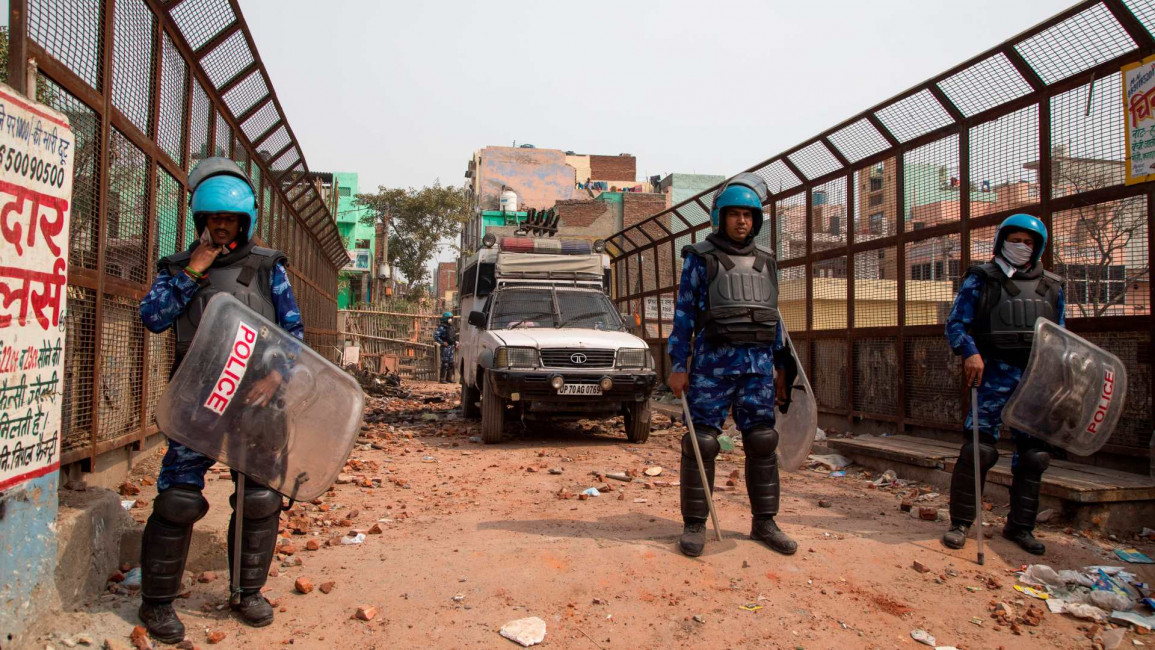Delhi police 'complicit and active' in India's deadly anti-Muslim riots, Amnesty investigation reveals
Delhi police 'complicit and active' in India's deadly anti-Muslim riots, Amnesty investigation reveals
'State-sponsored impunity' for Delhi police must end in order to bring justice to survivors of February's deadly anti-Muslim riots, Amnesty says.
2 min read
Police forces stood by as anti-Muslilm rioters wreaked havoc, according to Amnesty [Getty]
The Delhi police force committed "multiple human rights abuses" during anti-Muslim riots in February, including beatings, using excessive force, and torture of detainees, an investigation by Amnesty International India has revealed.
Police officers were "complicit and an active participant" in the deadly violence, standing by as rioters wreaked havoc and at times partaking in attacks led by Hindu nationalist mobs, according to Amnesty's investigation.
Fifty-three people, mostly Muslims, were killed during the riots, making them the deadliest show of communal violence witnessed by the capital in decades.
Police officers were "complicit and an active participant" in the deadly violence, standing by as rioters wreaked havoc and at times partaking in attacks led by Hindu nationalist mobs, according to Amnesty's investigation.
Fifty-three people, mostly Muslims, were killed during the riots, making them the deadliest show of communal violence witnessed by the capital in decades.
Avinash Kumar, Amnesty International India’s Executive Director, said: "Six months on, there has not been even a single investigation into the role of the Delhi police. This ongoing state-sponsored impunity sends the message that the law enforcement officials can commit grave human rights violations and evade accountability."
The investigation, based on interviews with more than 50 eyewitnesses, lawyers, doctors, rights activists and retired police officers, also follows the build-up to the riots.
Prior to the violence, Muslims in northeast Delhi had taken part in a weeks-long peaceful sit-in to protest the country's controversial new citizenship law.
The investigation, based on interviews with more than 50 eyewitnesses, lawyers, doctors, rights activists and retired police officers, also follows the build-up to the riots.
Twitter Post
|
Prior to the violence, Muslims in northeast Delhi had taken part in a weeks-long peaceful sit-in to protest the country's controversial new citizenship law.
Following a pattern of police brutality in university campuses, Kapil Mishra, the leader of the ruling Bharatiya Janata Party (BJP), told police they had three days to remove sit-in protesters. Violence broke out immediately after the speech.
Kumar urged the Ministry of Home Affairs to conduct a "prompt, thorough, transparent, independent and impartial investigation" into "hate speeches" made by politicians as well as all allegations of human rights violations by the police.
"This impunity sends the message to the politicians and police who advocate for violence in their speeches, and fail to prevent the violence that follows, that they can get away with committing grave human rights violations," said Kumar. "This impunity needs to, and must, end in order to bring justice to the victims and their family members."
Amnesty's investigation corroborates other media reports of anti-Muslim bias within the Delhi police.
Kumar urged the Ministry of Home Affairs to conduct a "prompt, thorough, transparent, independent and impartial investigation" into "hate speeches" made by politicians as well as all allegations of human rights violations by the police.
"This impunity sends the message to the politicians and police who advocate for violence in their speeches, and fail to prevent the violence that follows, that they can get away with committing grave human rights violations," said Kumar. "This impunity needs to, and must, end in order to bring justice to the victims and their family members."
Amnesty's investigation corroborates other media reports of anti-Muslim bias within the Delhi police.
During February's rampage, Hindu mobs armed with iron rods, bricks and bamboo sticks attacked the homes of Muslims, and set fire to mosques and businesses.
"Delhi has witnessed two major communal violence incidents across a period of four decades - the 2020 riots and the 1984 Sikh massacre," Amnesty said. "A common link between both the incidents is the human rights violations committed by the Delhi police."
The citizenship law fast-tracks naturalisation of foreign-born religious minorities of all faiths in South Asia except Islam, and has been described by the UN as "fundamentally discriminatory".
Follow us on Facebook, Twitter and Instagram to stay connected
The citizenship law fast-tracks naturalisation of foreign-born religious minorities of all faiths in South Asia except Islam, and has been described by the UN as "fundamentally discriminatory".
Follow us on Facebook, Twitter and Instagram to stay connected


![President Pezeshkian has denounced Israel's attacks on Lebanon [Getty]](/sites/default/files/styles/image_684x385/public/2173482924.jpeg?h=a5f2f23a&itok=q3evVtko)



 Follow the Middle East's top stories in English at The New Arab on Google News
Follow the Middle East's top stories in English at The New Arab on Google News


